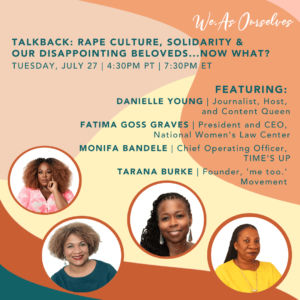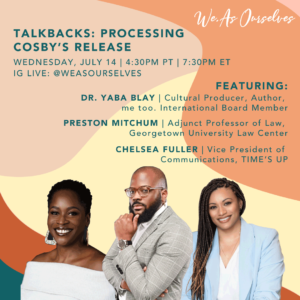Four years ago today, millions of survivors raised their voices and said “me too.” Despite the origins of the movement, started by Tarana Burke in 2006, Black survivors’ voices were missing from the viral narrative. In that spirit, We, As Ourselves was created by ‘me too.’ International, TIMES’ UP, and National Women’s Law Center to center the experiences of Black survivors and pledge our support for survivors within Black communities.
We launched in February 2021, and since, have made narrative interventions, hosted critical conversations, and provided resources for survivors grounded in love and healing. We’re excited to share this roundup with you and offer ways to keep the love for Black survivors flowing, especially today, on the anniversary of this viral moment.
WHAT WE’VE DONE SO FAR
Pledge Supporters. Since launch day, we are humbled to report that 1,997 people have taken the pledge in support of Black survivors. (Remember, you can always invite your communities to text LOVELETTER to 306-44 to watch our video tribute to survivors and take the pledge to show love for those who have been shut out, silenced, and scrutinized.)
Here are just a few examples of supporters committed to this work:


First-ever #BlackSAAMWeek. We did it—the first ever #BlackSAAM Week of Action was a success. This was only a dream a year ago, and relentless effort made it a reality. There were countless great highlights; here are a few:
- New resources for community and media: We released three new resources that continue to push the conversation forward about Black survivors. We released our first conversation guide with key themes and discussion questions from our first digital event entitled, “The Collective Power of Black Women to Reshape the Narrative about Sexual Violence.” We also released a set of Cultural Demands, useful guidance on ways to show up for Black survivors. And we released a guide for media on how to cover Black women, femmes, and girls as a response to the tragic and wholly unjust murder of Ma’Khia Bryant.
- Engaging our advocacy partners: We developed a #BlackSAAMWeek toolkit, outlining activities of each day and ways to get the word out. A non-exhaustive list of partners that uplifted #BlackSAAMWeek included: Black Women’s Roundtable, Movement For Black Lives, Ujima, Girls for Gender Equity, Ultraviolet, YWCA USA, Ms. Magazine, USOW, NNEDV, Girls Inc, WCASA, Justice for Migrant Women, End Rape on Campus, Gwen’s Girls, PowHer NY, No More, Rebellious Mag, Culture of Respect, NOVA, The Center for Hope & Healing, Futures Without Violence, and Yellow Heart Committee.
- Local media coverage: We, As Ourselves and the week of action was highlighted on local ABC stations across the country, including Tampa Bay, Denver, Cleveland, Kansas City, Phoenix, Denver, Milwaukee, Baltimore, and Los Angeles—here’s a clip. Scripps TV also published an interview that was sent to all of their owned and operated stations across the country. And we got national coverage in Ms. Magazine and The Root, which published interviews with Fatima Goss Graves, Tarana Burke, and Monifa Bandele.
Center for Cultural Power Partnership: Shifting Culture Through Art. We partnered with the Center for Cultural Power, an artist-led organization, to work with Black women and femme survivors and artists. To introduce these powerful artists and their work to our supporters, we kicked off a series of Instagram Live interviews. Monifa Bandele expertly hosted the first two interviews on behalf of TIME’S UP and ‘me too.’ International hosted the remaining two on their Instagram channel. These artists are shaping new narratives—ones that upend historical and cultural myths that harm and silence Black survivors. We closed the partnership with an artist talkback, discussing their creative processes, and how they move through their healing journey through the usage of art expression.

Narrative Research Briefings. We worked closely with Perry Udem, Chelsea Fuller, and Shannell Matthews in commissioning new narrative research to gather a baseline understanding of attitudes and beliefs of Black survivors in the U.S. to develop culturally competent, values-based, on-brand messaging that:
- Emboldens Black survivors to safely share their stories and experiences;
- Supplants historical and cultural narratives that harm and silence Black survivors;
- Offers direction and insight for modern frames and messages centered on joy, hope, community, and opportunity for Black survivors.
Via a series of briefings to include media and content creators, donors, and key partners, We, As Ourselves (WAO) will share initial findings from the narrative research in 2022. Additional goals for the briefings include:
- Building relationships with a community of stakeholders for WAO
- Generating conversation and discussion about the findings
- For media and content creators: Shaping near-term conversations related to Black survivors
- For donors and partners: Exploring the interconnectedness of narrative and movement building
Supporting Survivors. We are committed to finding ways to show up for survivors. To ensure that survivors’ voices are being heard, and not lost during critical and sensitive public moments, We, As Ourselves (WAO) shared public statements and provided timely resources to support the stories and experiences of Black survivors that otherwise might get dismissed.
- Statement in response to the news of the Pennsylvania Supreme Court’s decision to overturn Bill Cosby’s conviction
- Open Letter to Black Survivors
- In Defense of Survivors
Five Part Event Series in partnership with Lunchtable. In collaboration with Lunchtable, Blavity’s streaming and networking platform, our five-part digital conversation series centers on the power of Black survivors to tell their stories, exploring models of care, healing, accountability, and ways we shift the cultural conversation.
- Catch up with our most recent event: Virtual Event #4: Building Allegiance in the Fight to End Sexual Violence. Watch the replay and view the discussion guide to help further the conversation with your friends, family, and community.

In this conversation, our guest speakers discussed the role that Black men and masculine folks play in supporting Black survivors, exploring ways to show up for Black women—both cis and trans—with the vigor they exhibit when showing up for Black men, and creating an open dialogue about how we hold each other accountable and disrupt rape culture and toxic masculinity in our communities.
Check out this powerful conversation with four dynamic leaders:
- Jay Connor, Journalist, Producer, Consultant, and Founder of Extraordinary Ideas
- Preston Mitchum, Adjunct Professor of Law, Georgetown University Law Center
- Emanuel H. Brown, Executive Director and Steward, Acorn Center for Restoration and Freedom
- Phil Agnew, Co-Director, Black Men Build
Our entire conversation series can be found here. To read all discussion guides click here.
Talkback Series: We, As Ourselves is committed to always finding ways to collectively show up for survivors in the moment and in the future. As a result, we are teaming up with prominent content creators, and powerful influencers who have a strong voice in the Black community, to host important and authentic conversations on our social media platform. These conversations work to shift the narrative about sexual violence and Black survivors. For more information or to view all previous and upcoming conversations please visit our Instagram @weasourselves.
- Rape Culture, Solidarity & Our Disappointing Beloveds…Now What? An authentic conversation about rape culture, discussing the overturn of Cosby’s conviction, our beloveds supporting him, and asymmetric solidarity in the Black community. We, As Ourselves were in conversation with Danielle Young, Fatima Goss Graves, President and CEO, National Women’s Law Center, Monifa Bandele, Interim President and CEO, TIME’S UP, and Tarana Burke, Founder, ‘me too.’ Movement. Be sure to check out this conversation on our Instagram here.

- Processing Cosby’s Release. Following the Pennsylvania Supreme Court’s decision to overturn Bill Cosby’s conviction and release him from prison, We, As Ourselves released a public statement addressing the decision. In addition, we hosted an authentic conversation on our Talkback series about Bill Cosby’s release and the impact it’s had for all survivors. We had an engaging discussion with Dr. Yaba Blay and Preston Mitchum.

Color of Change Racial Justice Week of Action. We, As Ourselves, partnered with Color Of Change in a week of movement building, unity, action, and celebration for the Black community to commemorate the one year anniversary of the racial justice uprisings. Amongst other like-minded organizations we shared ample resources via their toolkit to keep folks engaged in ways to be informed and involved.
A Conversation with Patrisse Cullors + Monifa Bandele: In partnership with Creative Artist Agency (CAA), we held an intimate conversation with Patrisse Cullors and Monifa Bandele, hosted by TIME’S UP, Full Story Initiative, and Pop Culture Collaborative. Over 70 agents, showrunners, content creators, and executives in the entertainment industry heard from these two leaders in the movement to defend Black lives, working at the intersection of gender justice to break down the narratives that impact Black women, femmes, and girls.
- LEARN + TAKE ACTION: Folders with all resources can be found HERE.
- Patrisse & Monifa Bios
- Black Women & Incarceration: Changing the Narrative, written by Shakara Wyatt, Maxwell Addae, and Patrisse Cullors
- TIME’S UP We, As Ourselves Research
- TIME’S UP Critical Initiative
- Tip Sheet for Creators & Executives
Leave a Reply